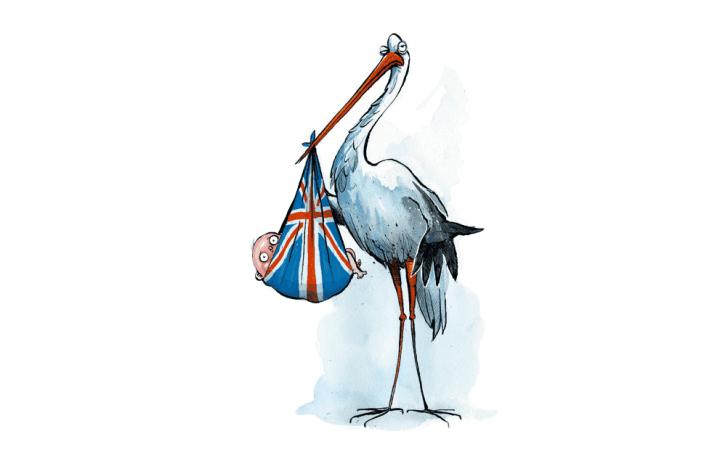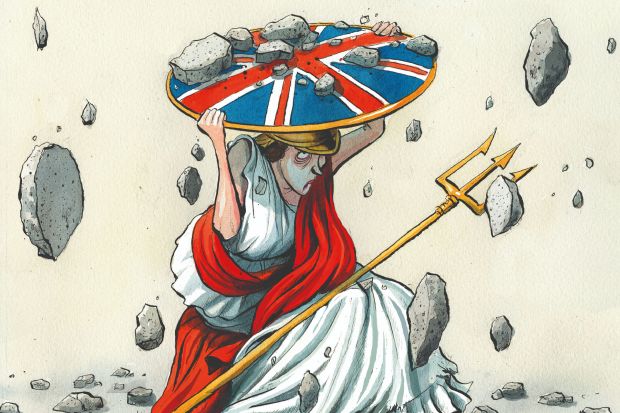Pope Francis wants you to have sex. Or at least he wants Italians to have more sex. The country, he says, is facing a ‘Titanic struggle’ against demographic doom. Last year, the population dropped by 179,000 people – and Italy is projected to lose another five million by 2050.
What’s happening in Italy is, to a greater or lesser extent, being repeated across the western world. In the UK in 2020, there were four workers per retiree. By 2041, the ONS projects there will be just three. We’re getting older, there are fewer of us and, all other things being equal, we’ll poorer for it. Either we tax the declining population more to maintain the same level of welfare or we will have to cut back on things like care and pensions.
The reason for this predicament is pretty obvious: we’re not having enough children. British couples are currently having 1.6 children, well below replacement at 2.1. So instead we fill the gap with immigration.
At this point, well-meaning people might start to feel a little queasy. Words like ‘replacement’ and ‘immigration’ do not sit comfortably together. Pope Francis had been speaking at an event in Rome alongside Giorgia Meloni, Italy’s Prime Minister, who has been accused of hawking the so-called ‘great replacement’ conspiracy theory.
The theory’s proponents believe that there is a plot to wipe out Europeans and replace them with migrants from the third world, and Meloni has spoken in ways that echo these sentiments. She has warned that Italian identity risks destruction by ‘globalists’, saying in parliament in 2018: ‘When you are a slave you act in Soros’s interests.’
The fertility gap is far too deeply embedded in our economy to fix with a few bungs
It’s a bit much. However, I worry that legitimate concerns about demographics are sometimes unfairly branded racist conspiracy theories. Take this article in Foreign Policy, which argues that ‘the great replacement theory is flexible enough to be used by conservatives in a watered-down form and dangerous enough to provide motive for terrorist attackers’.
Just imagine for a second what a ‘watered-down’ version of this theory might look like. If you said, for example, that there is no evidence of a plot, that in fact it sounds rather silly, but that countering falling birth rates with more migration is simply the response of politicians on short-term electoral cycles, I think you’d be pretty close to the truth.
There is another solution open to politicians, one that will take decades and is far harder to achieve. We could have more children. As noted, British couples are currently having just 1.6 children. However, when you ask women how many they want, the answer is 2.3, which would mean a growing population. Problem solved.
That gap, the missing 0.7 children, represents the greatest betrayal of modern politics. Having children is the single most meaningful thing a couple can do with their lives. It’s also a huge public good that makes us all richer – the average household pays £1.1 million in tax over a lifetime, so more households means more money for services – but it’s a public good whose cost is borne by private individuals. After inability through age, the first and second reasons given by reticent would-be parents are the effect on their lifestyle and the potential costs, which are currently estimated to be around £200,000 per child. British couples feel too poor to have children – and that makes us all poorer.
Those who are concerned about falling birth rates tend to argue for pro-natalist policies, which often involve some form of bribery. In countries like Estonia and Hungary, women are paid or receive tax breaks for having more children. But the majority of these policies fail for quite obvious reasons. Most people aren’t going to make the most life-changing decision imaginable simply because the government has brought in a bit of ad hoc legislation that might mean a couple of hundred extra quid in your back pocket.
The fertility gap is far too deeply embedded in our economy to fix with a few bungs. The other day I went for dinner with some friends who have a two-year-old. They’re on a combined income of well over £100,000 and yet are confined to a one-bed flat in north London. Their son will soon need to sleep on his own, so the couple are going to turn over their bedroom to the child and permanently sleep in the living room.
There is a dark irony to Britain’s fertility-housing trap. Last year, 205,000 homes were built. Meanwhile, net migration gave us 504,000 new people. When demand outstrips supply, prices go up. So the biggest cost in many young couples’ lives is going to rise. We know this means they’ll be less likely to have children, which in turn means we’re going to need to bring in more people to compensate. Of course, the answer to that particular problem is to build more houses. But that’s about as likely as the Pope denouncing Soros’s ‘plan’ to extinguish the white race.
Got something to add? Join the discussion and comment below.
Get 10 issues for just $10
Subscribe to The Spectator Australia today for the next 10 magazine issues, plus full online access, for just $10.




















Comments
Don't miss out
Join the conversation with other Spectator Australia readers. Subscribe to leave a comment.
SUBSCRIBEAlready a subscriber? Log in